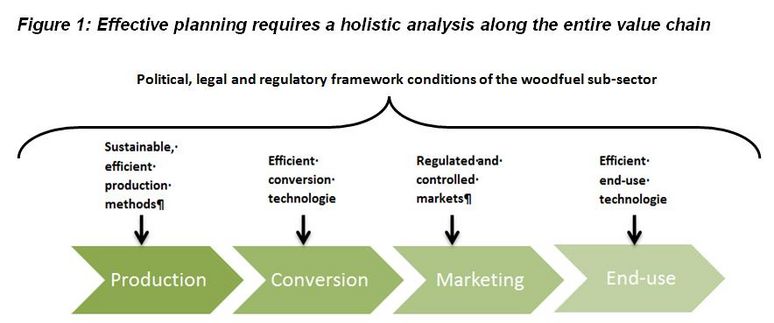Inception Studies for Biomass Energy Supply Opportunities
Prerequisite: Comprehensive assessment of the wood-fuel value chain
Measures to promote sustainable wood-fuel supplies should always be synchronized with the modernization of the entire wood-energy sector, in recognition of the fact that wood-based energy is an environmentally friendly/renewable, socially adapted, and clean/low‐risk source of energy. Promoting wood-energy on this basis calls for a stepwise, holistic approach, aiming for the continuous, through gradual refinement/adaptation of pertinent framework conditions, organizational and procedural aspects, and technological development. Political will is pivotal to this end.
In order to enhance a sustainable, pro-poor, regional woodfuel supply complying with criteria of ecological sustainability and fostering a local economic upswing, a holistic analysis of the whole woodfuel value chain is required.
The following list of questions is not exhaustive but indicative, outlining salient issues that enable dignosis and analysis leading to better project design and implementation.
It should be borne in mind that all measures aiming to enhance the wood-fuel supply chain are based on common principles and draw on the assumptions that:
- Substantial quantities of wood-fuel can be produced sustainably without undue impacts on food production,
- Appropriate technologies for conversion and utilization exist or can be introduced,
- Biomass use provides environmental benefits by way of substituting non-renewable fuels, thereby contributing to GHG mitigation,
- There exist potentials for enhancing economic benefits in terms of added value and employment.
It should be noted, that in regard to ICS interventions a specific list of questions can be viewed under the following link Inception Studies for ICS opportunities.
When analyzing and comparing data it is of utmost importance to ensure that adequate conversion factors are applied and local units are converted to international standards equivalents.
Information required on political and legal framework conditions
It is increasingly recognized that sound wood-fuel sector development must be an integral component of comprehensive environmental and development policies and planning processes. Although the forest sector is closely linked to many other sectors, there is a lack of coherent policies. Woodfuel production, transportation and distribution often remain informal and unregulated – rendering them inefficient, wasteful and risky.
- Is wood energy recognized as an important pillar in the future energy mix of the country?
- What are the existing policies, strategies and major programs (poverty reduction strategy (NPRP), national environmental strategy, forest and/or energy sector strategies etc.) relevant to the biomass energy sector?
- Do forest legislation/by-laws and regulations adequately address woodfuel supply issues and are they clearly and unambiguously laid down?
- Are woodfuel supply issues adequately coordinated between forest legislation and other pertinent laws?
- Is there a biomass strategy where wood energy is adequately addressed?




















